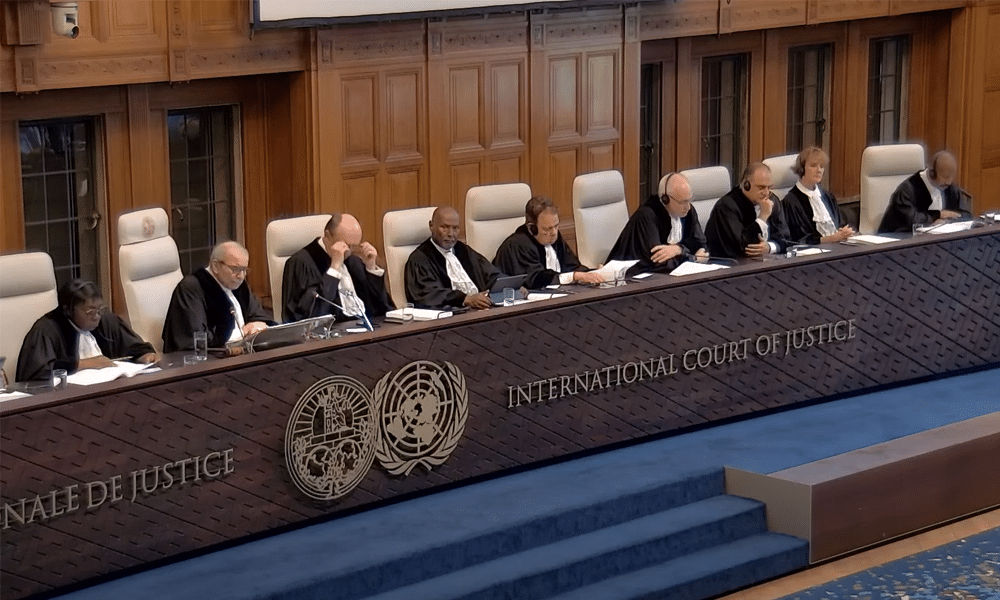The International Court of Justice (ICJ) has issued a landmark ruling declaring Israel’s continued presence in the occupied Palestinian territory as unlawful, calling for its end “as rapidly as possible”.
Nawaf Salam, president of the ICJ in The Hague, read the nonbinding advisory opinion on Friday, 19 July.
The 15-judge panel outlined various policies, including the expansion of Israeli settlements in the West Bank and East Jerusalem, exploitation of natural resources, annexation, and discriminatory policies against Palestinians, all of which were deemed violations of international law.
The court asserted that Israel has no right to sovereignty over the territories, is breaching international laws against acquiring territory by force, and is obstructing Palestinians’ right to self-determination.
The ICJ stated that other nations are obliged not to assist in maintaining Israel’s presence in the territory. The court emphasized that Israel must halt settlement construction immediately and dismantle existing settlements. Israel’s “abuse of its status as the occupying power” makes its presence in the occupied Palestinian territory unlawful, the court said.
The ruling was sought by the United Nations General Assembly in 2022. The ICJ, also known as the World Court, is the highest UN body for hearing disputes between states.
Israel captured the West Bank, Gaza Strip, and East Jerusalem in the 1967 war. It has since established and expanded settlements in the West Bank and East Jerusalem, and had settlements in Gaza before a 2005 withdrawal. The UN and most of the international community consider these territories as Israeli-occupied.
Reactions
Palestinian Foreign Minister Riyad Maliki described the ruling as a “watershed moment for Palestine, for justice and for international law”. He urged all states to uphold their obligations by ceasing any support for Israel’s illegal occupation.
Riyad Mansour, the Palestinian ambassador to the UN, called the ruling a “significant step” towards ending the occupation and securing the inalienable rights of the Palestinian people, including self-determination, statehood, and the right of return for Palestinians displaced in 1948 and 1967. Mansour vowed to work with allies to draft a comprehensive resolution at the UN General Assembly.
In contrast, Israel’s Ministry of Foreign Affairs dismissed the opinion as “fundamentally wrong” and one-sided. Prime Minister Benjamin Netanyahu’s office condemned the ruling as a “decision of lies” that distorts the truth, asserting that “the Jewish people are not occupiers in their own land”.
Ongoing Cases
In a separate case brought by South Africa, the ICJ is examining allegations that Israel is committing genocide in its war on Gaza. A preliminary ruling has already instructed Israel to prevent and punish incitement to genocide and to enhance humanitarian aid provisions.
In May, the ICJ ordered Israel to halt its offensive on Rafah in southern Gaza, citing “immense risk” to the hundreds of thousands of Palestinians seeking shelter there. Despite the order, Israel has continued its attacks on Gaza, including Rafah, in defiance of the UN court.
This ICJ ruling marks a significant development in the international legal landscape concerning the Israeli-Palestinian conflict, highlighting the urgent need for a resolution that respects international law and the rights of the Palestinian people.
Recent Developments
On Wednesday, 17 July, Israel’s parliament, the Knesset, passed a resolution rejecting the establishment of a Palestinian state. The resolution received significant support, with 68 votes in favor and just nine against, according to Israeli media reports.
It was co-sponsored by parties within Prime Minister Benjamin Netanyahu’s coalition, alongside right-wing opposition parties, and even received backing from Benny Gantz’s centrist National Unity party. Notably, lawmakers from Opposition Leader Yair Lapid’s center-left Yesh Atid party chose to leave the plenum rather than vote, despite Lapid’s previous support for a two-state solution. Opposition came only from members of the Labor, Ra’am, and Hadash-Ta’al parties.
This decision aligns with the Knesset’s historical stance against Palestinian statehood. In February, the Knesset passed a similar resolution addressing the unilateral creation of a Palestinian state without Israel’s consent.
As Israel’s war on Gaza continues, resulting in over 38,000 Palestinian deaths in nearly nine months, Tel Aviv has also taken “illegal steps” in the occupied West Bank.
The left-wing Israeli movement Peace Now reported on 4 July that the government has “legalized” three more settlement outposts. “The Higher Planning Council (HPC) approved in early July the advancement of 5,295 housing units in dozens of settlements throughout the West Bank,” Peace Now said in a statement. The building plans include the expansion of settlements deep within the West Bank and the legalization of three outposts.
According to Israeli estimates, more than 720,000 Israelis reside in settlements in the West Bank, including East Jerusalem. The Israeli military had earlier announced the seizure of 12,715 dunams (1 dunam = 1,000 square meters) of Palestinian land in the occupied West Bank. Settlement outposts are small communities established by illegal Israeli settlers on privately owned Palestinian land without approval from the Israeli government.

